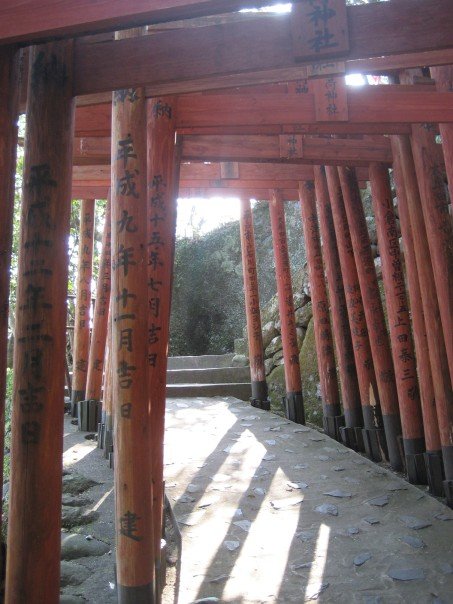As things are warming up, we can begin to think about doing summery things. Visit the ocean, have barbecues... or, best of all,
beat the heat with some うなぎ! Those of you who have been to a fancy eel restaurant may have already encountered the subject of today's post, but - as ever - the Yoji is here to provide you with all the "what"s and "why"s behind it. Without further ado...
松竹梅しょうちくばい
shouchikubaiThis phrase, unlike a lot of what we post here, lends itself especially well to people in earlier stages of Japanese study. First, alternative (more standard) readings of the kanji and definitions.
松 - まつ - Pine tree. This kanji sneaks into a few Japanese names.
竹 - たけ - Bamboo. This one will probably slip into the first 100 or so kanji you'll learn.
梅 - うめ - Plum. Be careful, though - not the sweet plum Western readers identify with, but a much smaller, sour fruit sometimes called a Japanese Apricot abroad.
Remember all that? Good. Now pretend you walk into an うなぎ restaurant, ready to swallow about 10 eels, and this menu greets you:

Oh man - pine tree in my うなぎ?! Does it get any better than this?! (Also, remember this menu as "Exhibit A" for later in the post.)

Sure, throwing a bunch of random plants into your うなぎ might seem like a great idea - but it turns out most stores have yet to capitalize on this superb idea. Instead, they are just using an old ranking system that happens to make use of these plants: 松竹梅.
The phrase, like so many, originated in China, and bears with it the association to "歳寒三友", which in Japanese translates to "absolutely nothing at all." If you go through the trouble of breaking down the meaning of the individual characters, it scans as "The three friends of winter" When you think of the three plants, the reason behind this makes perfect sense: Pine and bamboo are both green year round, even through the frigid winter months. Plum trees might go bare, sure, but they begin to blossom in late January/early February, earning them a spot with the two "evergreens" as plants that keep on kicking regardless of season.

About 700-some years ago in China, the three plants were also imbued with individual meanings. The pine, being huge, long-lived, and particularly resilient, came to symbolize endurance and longevity, sometimes being compared to a wise old man. The bamboo, being hollow and flexible, is largely related to open-mindedness and strength. The plum tree, being fragrant and striking when all else is desolate, represents inner beauty and purity. The three linked together are an auspicious symbol, displayed in both art and gardening in hopes of encouraging all of these attributes.

That is a heck of a lot of information to still have no idea why there is a small forest growing out of your eel. While I'm having trouble finding out the exact time, shop owners of yore requisitioned the phrase to spice up their menus. Say you go to a restaurant, and see "normal, high quality, highest quality" marking the three different cuts of steak you can get. Sure, the highest quality looks great, but that's gonna hurt your wallet. On the other hand, you're going to feel like a sap eating "normal" steak when the fancy stuff is there right beside it. What better way to add to the mystique and elegance of your restaurant by instead instituting a ranking system that forgoes traditional nomenclature in favor of... well... fancy names?

....aawwkkwwaarrdd.
Okay, so there is actual history here that makes the use of special titles a bit more prestigious than the stunts pulled by some Seattle-based coffee shop. And what's the problem if it's fairly simple to understand since, generally, it goes in order from highest ranked to lowest ranked as it's written: pine, bamboo, plum. 松竹梅. Done!
...except we're not. It turns out different stores have different interpretations of how to use this ranking system, meaning that you cannot always depend on 松 being the best bang for your buck. I refer you back to Exhibit A (aren't you glad you were paying attention?). The prices here ascend exactly as you'd expect: 梅 is cheapest at 1700 yen, 竹 takes the middle ground at 2700 yen, and 松 shames them both with 3200 yen. Now, gaze (or squint at) Exhibit B, and know despair:

The order has been magically reversed, with 松 clawing at the bottom and 梅 lording at the top. So why the discrepancy? It's hard to say. Many Japanese people assume that whenever 松 is cheaper, as is the case in Exhibit B, that just means you get a lot less, but it's higher quality. Unfortunately, this theory doesn't seem to hold a lot of water. I haven't been to hundreds of unagi restaurants, but I've found the most consistent dividing factor is quantity of food, and nothing more. It may have been true a long time ago - or to a few select restaurants - that the difference in quality remain was the key factor in the system, but the addition of 重 on Exhibit A, a kanji that is often encountered in 重い - heavy - seems to signify that mass is all that will change when you switch plants.
How do you stay savvy when there is no universal system for ranking portions? The restaurants may have dropped the ball, but you're the one who has to pick it up. While you can generally assume that whichever is higher priced will be a lot more of the same quality eel, just ask your server. You will not be the first or last to do so.
Wikipedia has a formidable list of songs and other areas of pop culture in which the phrase appears. Although it's not listed here, this ranking can be applied to almost any situation in which there are three menus of ascending quality. As a final note of scientific interest, these three are apparently representative of each of their plant types, though that's more of a coincidental footnote than the origin story.
This site answered a lot of my questions, as did
this one, although both are limited in scope.

Also...大変お待たせしました! Sorry to make you all wait so long. We started drinking this, and just couldn't stop.
 いく どうおん
いく どうおん



































